
Emergency Dentistry – Willow Grove, PA
Urgent Care You Can Depend On
Needless to say, no one ever expects a dental emergency to happen. But when one does, it is important to have a plan so you can get the care you need without delay. In many situations, an hour here or there could mean the difference between saving or losing a tooth! Fortunately for Willow Grove, urgent dental care is just a phone call away with Advanced Smile Design. When you contact us, we’ll work to see you as soon as possible so we can help solve your problem as quickly as we can.

Why Choose Advanced Smile Design for Emergency Dentistry?
- Same-Day Appointments Available
- Dental Office That Only Uses the Latest Technology
- Skilled Team with Years of Emergency Experience
How We Treat Dental Emergencies
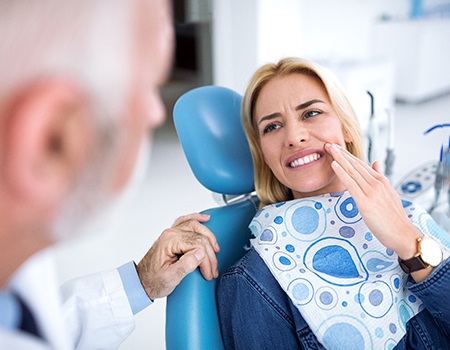
Dental emergencies can take many different forms, but our approach to handling them can usually be broken into the following four simple steps:
- Same-Day Appointments: When you call our office, a team member will give you first-aid advice and schedule an emergency visit. To ensure that you don’t have to wait too long for relief, we offer same-day appointments in emergency situations.
- Emergency Exam: We need to figure out the underlying cause of the problem as well as how extensive the damage is. As such, once you get to our office, a full examination of your mouth will be performed. We’ll also put a stop to any severe discomfort you might be in.
- Review Findings: Once your examination is complete, we can give you a detailed explanation of our findings. We’ll outline the available treatment options and let you know what we recommend. Of course, we’ll always give you an estimate of the cost and timeline of a suggested treatment before a decision has to be made.
- Get the Care You Need: Once you’ve committed to a treatment (which could mean dental crown placement, root canal therapy, tooth extraction, or another procedure), we can move forward with the process of addressing your oral health issues and putting a stop to your pain.
The Most Common Dental Emergencies
Dental emergencies are often the ultimate result of poor oral hygiene practices, but sometimes they’re also the outcome of an accident. Regardless of the cause, you should seek help from a dental professional without delay. Below, you’ll find examples of some particularly common emergencies that we treat at our office in Willow Grove.
Understanding the Cost of Dental Emergencies

It’s important to know that there is no set cost for treating a dental emergency. Our treatment recommendations will be based solely on the needs of the patient. One person might just need a small filling, while another may require a root canal and crown. Our goal is always to get someone out of pain before addressing any structural damage. For patients/parents concerned about an unexpected dental expense, we accept dental insurance, offer low-to-no-interest financing, and even have our own In-House Savings Plan. Keep reading to learn all about the cost of emergency dentistry in Willow Grove.
Every Dental Emergency is Unique

Even though it might seem convenient to provide a cost estimate over a phone call, it’s impossible to do so without an initial consultation. Our team will first need to evaluate your oral health in person before we can tell you how much a dental emergency will cost, as every patient’s case is different. For instance, a person may only need a simple filling while another might require tooth extraction. Before beginning any work, we’ll walk you through your treatment options and review the overall price so you know what to expect.
Does Dental Insurance Cover Dental Emergencies?
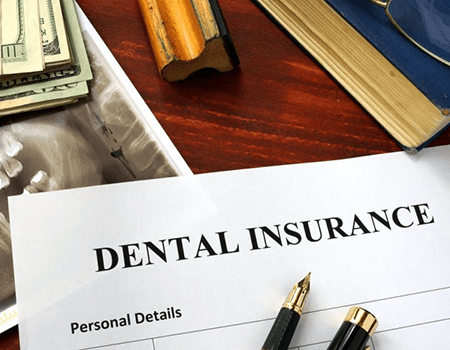
In most cases, preventive and restorative treatments, such as checkups and cleanings, fluoride treatment, fillings, and dental crowns will often receive complete or partial coverage. This will depend on each person’s insurance provider, so it’s important to verify the details of your policy before starting any procedures. Our team is also more than happy to help you navigate your plan so that you can maximize your benefits while maintaining a healthy smile.
Other Options for Making Dental Emergencies Affordable

If you don’t have dental insurance, it doesn’t mean you’ll be out of options for making your dental care affordable. Our team provides multiple options that can help lower your out-of-pocket expenses when treating dental emergencies. We offer alternative financing through third-party financiers like CareCredit and Sunbit, which can turn the overall cost of your treatment into low-to-no-interest monthly payments. We also have an in-house savings plan that gives 20% discounts on any restorative/cosmetic treatment for one low annual fee. For new patients, we provide emergency visits for $49, which include an exam and X-rays.
Taking Care of Your Smile Can Save You Money

Though we can help address your dental emergency, it’s also best to practice preventive measures that can help you avoid complications in the future. The majority of urgent situations originate from oral health issues that could have been treated early on. For this reason, you should consider investing in your smile with regular dental checkups and cleanings every six months or sooner to maintain healthy teeth and gums. Our team will also thoroughly polish your pearly whites, that way you can show off your grin without many worries.
Keys to Preventing Dental Emergencies
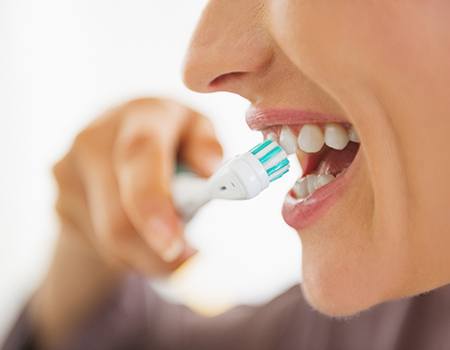
You want to protect your smile from harm, right? We have some good news for you: there are several habits you can adopt that will dramatically reduce your chances of experiencing a painful toothache, bleeding gums, a damaged restoration, or something similar. So, read on!
Keep Up with Your Oral Hygiene Routine
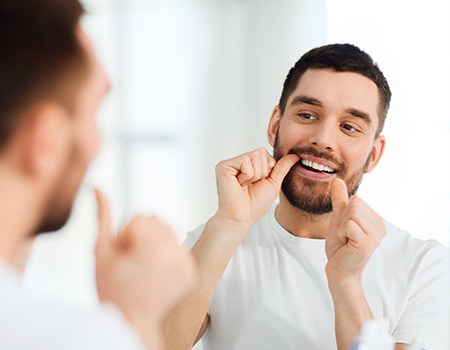
Be honest… Do you forget to floss from time to time? Do you quickly “brush” your teeth with some water when you’re tired at the end of the day? Do you skip rinsing with mouthwash entirely? Although habits like these may not seem like a big deal, they dramatically increase your risk of dental damage. The good news is that there is no time like the present to start new!
Tip: Set a reminder on your phone or put a Post-It on your bathroom mirror so you don’t forget!
Get a Dental Checkup and Cleaning Twice a Year
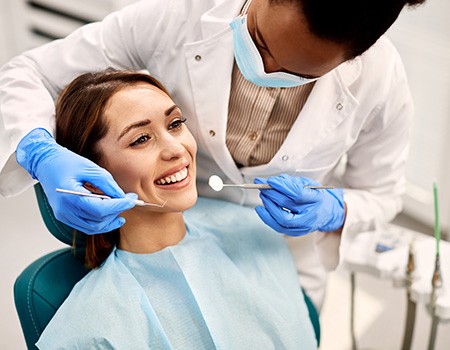
Simply put, dental checkups and cleanings are crucial, even if you take good care of your smile at home or aren’t feeling any discomfort. These biannual visits ensure that we catch any dental problems that do arise in the early stages and that harmful substances, like tartar, are cleared away. In other words, these preventive care appointments go a long way in stopping those small issues that could morph into an emergency later.
Stick to a Nutritious Diet

Unfortunately, over-consumption of starchy and sugary foods can lead to tooth decay as well as other oral health problems. That’s why we recommend keeping snacking to a minimum and sticking to a well-balanced, nutrient-dense diet. This ensures that your body has everything it needs to fight off infections as well as keep your jawbone and enamel strong. So, do your best to eat a variety of fruits and vegetables, lean proteins, healthy fats, and filling carbohydrates!
Don’t Chew on Hard Objects
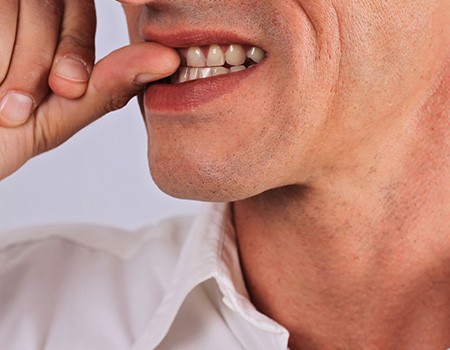
In short, you shouldn’t munch on ice or chew on other hard items like pens, pencils, or fingernails. This can wear down and even crack your teeth, which would warrant an immediate visit to our Willow Grove dental office. We recommend opting for healthier alternatives, like chewing on sugar-free gum instead of the back of your pencil.
Tip: If you’re having trouble getting a package open, be sure to grab the scissors instead of using your teeth!
Wear a Protective Mouthguard During Sports
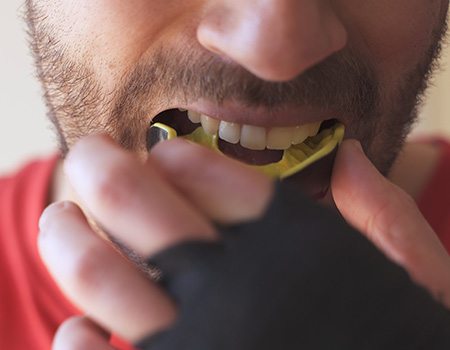
Sports-related injuries can happen even during non-contact sports. So, make sure that you wear a protective mouthguard every time – whether you start your morning with a run, you play frisbee with friends after school, or you end your day lifting weights at the gym. This will ensure that your smile is safe from any unexpected impact.
Dental Emergency FAQs
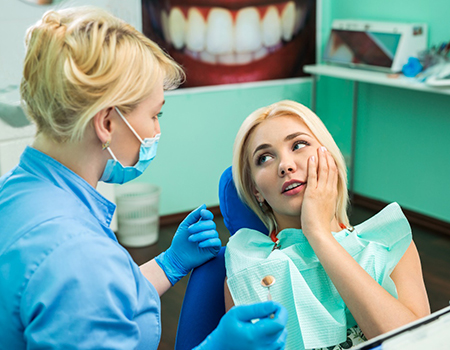
At this point, you may see how emergency dentistry is helpful. It does, after all, have the power to save your teeth! That said, you likely want to know more details about the field. Having such facts will help you settle if treatment is right for you. Luckily, we at Advanced Smile Design can ease your concerns: below are the answers to popular dental emergency questions. Reading them should help you confirm how an emergency dentist in Willow Grove works. Otherwise, you’re always free to call us.
Can the emergency room remove a tooth?
Generally, no – an emergency room isn’t equipped to pull teeth. Only licensed dentists can perform a tooth extraction, making the procedure illegal for anyone else. Hospital staff aren’t exceptions to this rule.
At best, an emergency room can provide antibiotics and pain medication. However, these things won’t address the problem underlying your toothache. They’ll only (temporarily) relieve some of its worst symptoms.
Besides, keep in mind that a tooth extraction may be unnecessary. If you see a dentist quickly enough, root canal therapy can treat your problem before it worsens. You’d then be able to save your tooth from being pulled.
Do chipped teeth heal?
True enough, tooth enamel is resilient; it’s even the hardest substance in the human body. Still, the fact remains that it won’t heal on its own. At most, chipped teeth can only re-mineralize – deposit calcium and phosphate into pre-existing enamel. That process repairs your pearly whites but doesn’t “grow back” the enamel they’ve lost.
Ultimately, only restorative or cosmetic dentistry can change a tooth’s condition. As such, you might want to hide a chip with dental bonding, a crown, or a porcelain veneer. It could remain visible and unsightly otherwise.
Should knocked-out teeth be placed in water?
While you can rinse a tooth with water, you shouldn’t place it in any. Prolonged exposure to water damages the surface cells of teeth. Therefore, storing a knocked-out tooth in the liquid reduces your chances of saving it.
Alternatively, you should hold the tooth in its original socket. Doing so gives your dentist a better chance of getting it back in place. If that option isn’t possible, though, you can store the tooth in milk or saline solution for up to one hour.
What does chronic bad breath mean?
Everyone suffers from bad breath occasionally; it’s a normal part of life. Chronic bad breath, though, is different. Also known as halitosis, this condition is often a sign of serious oral problems. These might include:
- Gum disease – One of the main symptoms of gum disease is bad-smelling breath. If infected gums are the source of your halitosis, you should seek dental care immediately.
- Tooth Decay/Cavities – The same bacteria that decay teeth also tend to cause foul odors.
- Dry Mouth – Your mouth might produce an insufficient amount of saliva. In that case, smelly bacteria can gather on your tongue, creating bad breath.
If your bad breath persists for an extended period, see your dentist immediately.
What Does Throbbing Tooth Pain Mean?
Throbbing tooth pain is likely to be a sign of inflammation or infection inside the tooth. This can happen due to severe decay or cracks exposing the tooth’s inner chamber to bacteria, causing it to become irritated or infected. However, some throbbing tooth pain is caused by habits like chronic teeth clenching or grinding.
Will My Toothache Go Away on Its Own?
Since toothaches do not typically go away on their own, it’s best to schedule an appointment at our office in Willow Grove if you have one so we can make sure that there isn’t anything wrong. Toothaches can result from a variety of factors, so it’s important to determine what causes a particular case and address it appropriately. This can reveal underlying oral health problems and prevent more serious issues down the line. However, some toothaches, such as those caused by irritated gum tissue, may go away on their own.
What if My Toothache Suddenly Disappears?
If you find that your severe, throbbing toothache disappears one day, it doesn’t necessarily mean that the issue has been resolved. In fact, this can be a sign that the tooth decay has killed the nerve inside the tooth, and this sort of infection may spread to other parts of the mouth or even other tissues in the body if it isn’t dealt with. If your toothache seems to suddenly disappear, it’s still best to visit us at our office in Willow Grove so we can see if you need treatment.
Should I Visit the Emergency Room First for Dental Emergencies?
The typical emergency room is not equipped to deal with dental emergencies, so it’s best to immediately bring these problems to our attention in most cases. However, an emergency room may be the better choice if you believe your jaw is broken or dislocated, you have severe cuts or lacerations in your face or mouth, or an oral infection is making it difficult to breathe or swallow. If you have a dental emergency when no dentist is available, an emergency room may be able to set you up with pain relievers and antibiotics and treat a dislodged tooth so it stays in savable condition for up to twenty-four hours. This should be enough to tide you over until our office opens in the morning.
How Long Can a Tooth Last After It Has Been Knocked Out of Your Mouth?
Your tooth will begin to die about fifteen minutes after it is dislodged from its socket, and it is most likely to be saved if you get to our office within thirty minutes. However, there are certain cases where a tooth can be saved even if it has been dislodged for more than an hour. You can help your tooth stay alive longer while transporting it to our office by placing it back in its socket, keeping it inside your lip or cheek, or storing it in a container filled with milk or saliva. If you use a tooth preservation kit approved by the American Dental Association, the tooth may be able to remain in savable condition for up to twenty-four hours.
I Need a Checkup & Cleaning I Have a Cavity or Broken Tooth I am Missing One or More Teeth I am Interested in Improving My Smile I am Looking for a Dentist for My Child I am Anxious or Afraid of the Dentist I Want a Straighter Smile I Want to Learn About Sleep Apnea View Our Services
